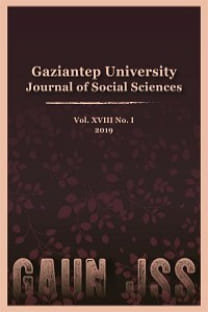‘Zaman Uçuyor’: Percy Bysshe Shelley’nin Şiirlerinde Lirik ve Tarihsel Zaman
‘Time is flying’: Lyrical And Historical Time in the Poetry of Percy Bysshe Shelley
___
- Abrams, M. H. (1965). Structure and style in the greater romantic lyric. In F. W. Hills and H. Bloom (Eds.), From sensibility to romanticism: essays presented to Frederick A. Pottle, 527-560. Oxford: Oxford University Press.
- Burke, E. (1791a). Reflections on the Revolution in France. Dublin.
- Burke, E. (1791b). Letter to a Member of the National Assembly. London: Dodsley.
- Byron, G. G. (1986), Lord. A critical edition of the major works. J. J. McGann (Ed.): Oxford: Oxford University Press.
- Cuvier, G. (1813). Essay on the theory of the earth. (R. Kerr Trans.). Edinburgh: Blackwood.
- Duffy, C. (2015). Percy Shelley’s ‘Unfinished Drama’ and the problem of the Jane Williams poems. European Romantic Review, 26(5), 615-632.
- Duffy, C. (2013). The landscapes of the sublime, 1700-1830: ‘classic ground’. London: Palgrave.
- Duffy, C. (2006). Shelley and the revolutionary sublime. Cambridge: Cambridge University Press.
- Fukuyama, F. (1992). The end of history and the last man. New York: Free Press.
- Gibbon, E. (1788). The history of the decline and fall of the Roman empire. London. Strahan & Cahell.
- Godwin, W. (1793). Enquiry concerning political justice and its influence on morals and happiness. London: Robinson.
- Goethe, J. W. Von. (1808). Faust: Eine Tragödie. Erste Teil. Tubingen: Kollen.
- Lewis, D. (2014). Shelley’s critique of Malthus in ‘A Defence of Poetry’. European Romantic Review, 25(5), 575-590.
- Malthus, T. (1798). Essay on the principle of population. London: Johnson.
- Matthews, G. (1962). On Shelley’s ‘The Triumph of Life’. Studia Neophilologica, 34, 104-134.
- Matthews, G. (1961). Shelley and Jane Williams. Review of English Studies, 45, 40-48.
- Morton, T. (2006). Nature and culture. In T. Morton (Ed.). The Cambridge Companion to Shelley, 185-207. Cambridge: Cambridge University Press.
- Morton, T. (1994). Shelley and the revolution in taste. Cambridge: Cambridge University Press.
- Paine, T. (1791). The rights of man. London: Jordan.
- Pulos, C. E. (1952). Shelley and Malthus. PMLA, 67(2), 113-124,
- Reiman, D. (1965). Shelley’s ‘The Triumph of Life’: a critical study. Urbana: University of Illinois Press.
- Reiman, D. (1963). Shelley’s ‘The Triumph of Life’: the biographical problem. PMLA, 78, 536-550.
- Rudwick, M. (2005). Bursting the limits of time: the reconstruction of geohistory in the age of revolution. Chicago. University of Chicago Press.
- Scrivener, M. H. (1982). Radical Shelley. New York: De Gruyter.
- Shelley, P. B. (2017). Percy Bysshe Shelley: selected poems and prose. J. Donovan and C. Duffy (Eds.). London: Penguin.
- Shelley, P. B. (1964). The letters of Percy Bysshe Shelley. 2 volumes. F. L. Jones (Ed.). Oxford: Clarendon.
- Shelley, P. B. (1954). Shelley’s prose. D. L. Clark (Ed.). Albuquerque: University of New Mexico Press.
- Springer, C. (1987). The marble wilderness: ruins and representation in Italian romanticism, 1775-1850. Cambridge: Cambridge University Press.
- Wordsworth, W. (2008). William Wordsworth: the major works. S. Gill (Ed.). Oxford World’s Classics: Oxford.
- ISSN: 1303-0094
- Yayın Aralığı: 4
- Başlangıç: 1991
- Yayıncı: Gaziantep Üniv. Sosyal Bilimler Enst.
1796: Korku Baladı Britanya’ya Geldiğinde
Bayan Warren’in Mesleği Oyununda Dramatik ve Politik Tanınma
Paolo Bacigalupi’nin Post-Apokaliptik Romanı Kurma Kız’da Nostalji Teması Üzerine
Hari Kunzru’nun Gölgenin Gölgesi Adlı Eseri ve Taklitçi Oluşum Romanı
‘Zaman Uçuyor’: Percy Bysshe Shelley’nin Şiirlerinde Lirik ve Tarihsel Zaman
John Fowles’un Koleksiyoncu Romanında Neo-Viktorya Dönemi Materyalist Yaklaşımı
Shakespeare’in Kral Lear Oyununda Mantığı Terketmek için Kutsal Sebep
Sevim Burak ve Ursula K. Le Guin’in Eserlerinde Evli Kadınların Temsili
Florence Marryat’ın The Blood of the Vampire Romanında Baş Döndürücü Bir Yüzyıl Sonu
